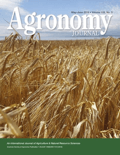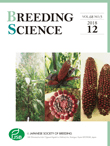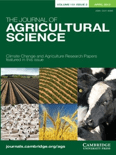
Crop Breeding and Applied Biotechnology
Scope & Guideline
Advancing agricultural innovation through cutting-edge research.
Introduction
Aims and Scopes
- Crop Genetic Improvement:
Research dedicated to the genetic enhancement of various crops through traditional breeding and modern biotechnological methods, focusing on traits such as yield, disease resistance, and stress tolerance. - Molecular Breeding Techniques:
Utilization of molecular markers, genomic selection, and advanced breeding designs to facilitate the identification and introgression of desirable traits in crops. - Diversity and Genetic Analysis:
Studies that assess genetic diversity, population structure, and genetic relationships among crop varieties to inform breeding strategies and conservation efforts. - Trait Mapping and QTL Analysis:
Identification of quantitative trait loci (QTL) associated with important agronomic traits, providing insights for targeted breeding programs. - Sustainability in Crop Production:
Research focusing on sustainable agricultural practices, including the development of cultivars that require fewer inputs, such as water and fertilizers, and those that exhibit resilience to climate change. - Biotechnology Applications in Crop Breeding:
Exploration of biotechnological tools, including genetic engineering and CRISPR technology, aimed at developing crops with enhanced traits.
Trending and Emerging
- Genomic Selection and Precision Breeding:
An increasing trend towards the application of genomic selection techniques that leverage high-throughput genotyping and phenotyping to accelerate the breeding process and improve selection accuracy. - Climate Resilience and Stress Tolerance:
A notable emphasis on developing crop varieties that are resilient to climate-related stresses, such as drought, flooding, and temperature extremes, to ensure food security in changing environments. - Biotechnological Innovations:
Emerging research focused on the application of CRISPR and other gene-editing technologies to create crops with precise modifications for enhanced traits, reflecting a shift towards more targeted genetic improvements. - Sustainable and Organic Breeding Practices:
Growing interest in breeding strategies that promote sustainability and organic farming, including the development of cultivars that require fewer chemical inputs and are better adapted to organic systems. - Integration of Machine Learning and AI in Breeding:
A trend towards utilizing machine learning and artificial intelligence to analyze breeding data, predict outcomes, and optimize breeding strategies, representing a modern approach to crop improvement.
Declining or Waning
- Traditional Breeding Methods:
There seems to be a reduced focus on purely traditional breeding methods as researchers increasingly adopt biotechnological approaches and molecular tools to improve crop varieties. - Single-trait Breeding Programs:
A declining emphasis on breeding for single traits in isolation, with a growing preference for multi-trait selection strategies that address complex agricultural challenges. - Conventional Crop Management Practices:
Less attention is being paid to conventional agronomic practices, as advancements in technology and breeding techniques take precedence in the journal's focus.
Similar Journals

Legume Research
Unlocking the Potential of Legumes for Global ImpactLegume Research, published by the AGRICULTURAL RESEARCH COMMUNICATION CENTRE in India, is an essential peer-reviewed journal focusing on advancements in the field of agronomy, crop science, soil science, and plant science. With an ISSN of 0250-5371 and operating since 2008, this journal caters to researchers, agricultural professionals, and students interested in the critical role of legumes in sustainable agriculture and food security. It ranks within the third quartile (Q3) in several prominent categories, reflecting its contribution to the agricultural and biological sciences community—ranking #279 in Agronomy and Crop Science, #113 in Soil Science, and #376 in Plant Science based on Scopus metrics. Although not open access, Legume Research remains a vital resource for those seeking to enhance their knowledge and contribute novel research findings in the ever-evolving discipline of legume cultivation and utilization. With a clear objective to disseminate impactful research, this journal significantly contributes to the global understanding of legumes' ecological, economic, and nutritional importance.

AGRONOMY JOURNAL
Exploring the Future of Agronomy and Crop ScienceThe Agronomy Journal, published by Wiley, is a leading platform for cutting-edge research in the field of agronomy and crop science. Established in the United States, this prestigious journal carries the ISSN 0002-1962 and E-ISSN 1435-0645, with its coverage spanning from 1976 to 2024, showcasing a wealth of knowledge over decades. The journal is recognized in the top quartile (Q1) of its category, making it a highly respected source for quality literature, ranking #108 out of 406 in the Scopus database and reflecting a 73rd percentile standing in agricultural and biological sciences. While it operates under traditional access options, its commitment to disseminating valuable scientific inquiry aligns with the objectives of advancing sustainable agricultural practices globally. The Agronomy Journal serves as an indispensable resource for researchers, professionals, and students eager to stay abreast of significant advancements and discussions influencing the future of crop science and agronomic research.

INDIAN JOURNAL OF GENETICS AND PLANT BREEDING
Bridging Science and Agriculture for Global ImpactIndian Journal of Genetics and Plant Breeding, ISSN 0019-5200, published by the Indian Society of Genetics and Plant Breeding, serves as a pivotal platform for research in the fields of genetics and plant breeding. Based in India, this journal provides valuable insights into the latest developments, methodologies, and findings that drive innovation and enhance the agricultural landscape. With a convergence period extending from 2008 to 2024, this journal maintains a strong focus on advancing our understanding of genetic mechanisms in plants, contributing significantly to both academic circles and practical applications in agriculture. Although presently ranked in the fourth quartile for Genetics and the third quartile for Plant Science, the journal aims to elevate its impact factor and enhance visibility among research communities through rigorous peer-reviewed articles. Published in both print and online formats, the journal is accessible to a global audience and emphasizes the importance of open communication in fostering scientific advancements. Researchers, professionals, and students alike will find this journal an essential resource for staying abreast of trends and breakthroughs in genetic research and plant breeding.

BREEDING SCIENCE
Pioneering Innovations in Plant BreedingBREEDING SCIENCE is a premier journal published by the Japanese Society of Breeding, dedicated to the advancement of knowledge in the disciplines of agronomy, plant science, and genetics. Established in 1993, this influential publication has consistently contributed to the global research community, showcasing high-quality studies that intersect innovative breeding techniques with pressing agricultural challenges. With an esteemed Scopus rank placing it in the top quartile of Agronomy and Crop Science and the second quartile in Plant Science, BREEDING SCIENCE is essential reading for researchers, professionals, and students alike. The journal's reach and rigor are evidenced by its significant presence in leading academic databases, providing insights and advancements that are critical for improved crop production and sustainable practices. Although it does not currently offer open access options, the depth and relevance of its content ensure that it remains a vital resource for those committed to exploring the evolution and impact of breeding science. For further information, readers are encouraged to connect directly with the journal via its administrative office located at the University of Tokyo's Graduate School of Agricultural and Life Sciences.

JOURNAL OF AGRICULTURAL SCIENCE
Exploring the Frontiers of Agronomy and GeneticsJOURNAL OF AGRICULTURAL SCIENCE, published by Cambridge University Press, stands as a pivotal resource in the field of agricultural research. With a rich history dating back to 1905, this esteemed journal has consistently delivered cutting-edge scholarly articles that address pressing issues in agronomy, crop science, animal science, and genetics. Currently holding a Q2 ranking in Agronomy and Crop Science and Animal Science and Zoology, and a Q3 in Genetics, it reflects a robust impact within the academic community, contributing to innovative practices and technologies in agriculture. Indexed in Scopus, its authors benefit from broad visibility, supported by a strong readership among researchers, professionals, and students alike. While the journal does not currently offer open access, its rigorous peer-review process ensures that published works meet the highest scholarly standards, fostering a rich environment for knowledge exchange and advancement in agricultural science.

MOLECULAR BREEDING
Unlocking the Future of Crop Resilience and GeneticsMOLECULAR BREEDING is a prestigious journal published by Springer, dedicated to advancing the field of agronomy, plant science, and biotechnology through innovative research contributions. With an impressive ISSN of 1380-3743 and E-ISSN 1572-9788, this journal has continuously served the scientific community since its inception in 1995. Operating from the Netherlands, MOLECULAR BREEDING is recognized for its high impact factor and status in the Q1 quartile for both Agronomy and Crop Science and Plant Science in the latest 2023 metrics, highlighting its influential role in these domains. With strong Scopus rankings reflecting its position within the top percentiles of various related fields—including a notable 81st percentile in Plant Science—this journal is essential for researchers, professionals, and students striving to understand and innovate in molecular genetics and breeding techniques. Although it does not provide open access, its rigorous peer-review process ensures that published articles maintain the highest standards and contribute significantly to the scientific discourse. The journal’s diverse scope encompasses significant advancements in molecular biology and genetics, ultimately supporting the global objectives of sustainable agriculture and enhanced crop resilience.

Vavilovskii Zhurnal Genetiki i Selektsii
Cultivating Insights for a Sustainable FutureVavilovskii Zhurnal Genetiki i Selektsii, with ISSN 2500-0462 and E-ISSN 2500-3259, is a distinguished open-access journal published by the Russian Academy of Sciences, Institute of Cytology and Genetics. Since transitioning to open access in 2013, the journal has been dedicated to advancing research and discourse in the fields of genetics and selection, particularly within agricultural and biological sciences. With a current ranking of Q2 in Agricultural and Biological Sciences and Q3 in Biochemistry, Genetics and Molecular Biology according to Scopus, it serves as a pivotal platform for researchers, professionals, and students to disseminate their findings and collaborate on innovative ideas. The journal, housed in the vibrant academic environment of Novosibirsk, Russia, publishes a diverse range of articles that contribute to the ongoing evolution of genetic studies and practical applications in agriculture. Its commitment to quality and accessibility ensures it plays an essential role in the global scientific community, fostering knowledge that bridges theoretical research and practical implementation.

GENETIC RESOURCES AND CROP EVOLUTION
Cultivating Knowledge on Crop Genetics and EvolutionGENETIC RESOURCES AND CROP EVOLUTION is a leading academic journal dedicated to the exploration and advancement of genetic resources in agriculture, evolutionary biology, and plant science. Published by Springer in the Netherlands since 1992, this journal aims to foster a greater understanding of the genetic basis of crop evolution and diversity. With a robust impact reflected in its Q2 status in multiple categories, including Agronomy, Ecology, and Plant Science, it ranks impressively within the top quartiles of its fields. As of 2023, it continues to be an essential resource for researchers, professionals, and students who seek to enhance sustainable crop production and biodiversity conservation through innovative genetic methodologies. The journal promotes high-quality, peer-reviewed research that contributes valuable insights into the genetic adaptation of crops in response to environmental changes. While the journal is not open access, its esteemed reputation ensures that the insights it provides reach a wide audience eager to address some of today's most pressing agricultural challenges.

Revista Fitotecnia Mexicana
Empowering Professionals Through Cutting-Edge ResearchRevista Fitotecnia Mexicana is a prominent academic journal published by the SOC MEXICANA FITOGENETICA, dedicated to advancing knowledge in the fields of agronomy, crop science, genetics, horticulture, and plant science. With its establishment dating back to 2007 and currently running through 2024, this journal serves as an important platform for researchers, professionals, and academic institutions interested in plant genetic resources and agricultural innovations. Although it holds a Q4 quartile ranking in various categories and is positioned within the lower percentiles in Scopus rankings, it provides crucial insights and opportunities for emerging ideas and local research initiatives. Based in Mexico, and with its indexed ISSN 0187-7380, the journal plays an important role in stemming from the rich agricultural heritage of the region. The lack of open access options underscores the depth of curated content provided, making it a valuable resource for professionals seeking to expand their expertise in the sector.

SPANISH JOURNAL OF AGRICULTURAL RESEARCH
Empowering Scholars to Transform Agricultural LandscapesThe Spanish Journal of Agricultural Research (ISSN: 1695-971X, E-ISSN: 2171-9292), published by the prestigious Consejo Superior Investigaciones Cientificas (CSIC), serves as a vital resource for those engaged in the fields of agronomy and crop science. Established as an Open Access journal since 2003, it aims to foster the dissemination of innovative research and practical applications related to agricultural practices and sustainability. With its Q3 category in Agronomy and Crop Science and a Scopus ranking of #224 out of 406, the journal provides an accessible platform for scholars to share valuable findings that enhance agricultural productivity and environmental stewardship. Covering research from 2006 to 2024, this journal continues to be instrumental for researchers, professionals, and students eager to remain at the forefront of agricultural science advancements.